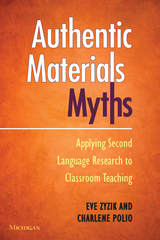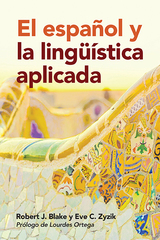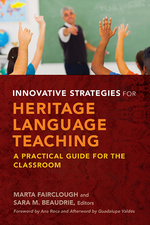
The myths examined in this book are:
- Authentic texts are inaccessible to beginners.
- Authentic texts cannot be used to teach grammar.
- Shorter texts are more beneficial for language learners.
- Activating background knowledge or making a word list is sufficient to prepare students for authentic texts.
- Authentic texts can be used to teach only listening and reading.
- Modifying or simplifying authentic texts always helps language learners.
- For learners to benefit from using authentic texts, the associated tasks must also be authentic.

Informed by the latest research in the fields of second language acquisition and applied linguistics, El español y la lingüística aplicada responds to the central questions that lie at the heart of learning Spanish as a second or foreign language. What does it mean to know a language? Can technology help second language learners? How does studying abroad promote language acquisition?
Framing chapters in terms of these and other critical areas of inquiry, Robert J. Blake and Eve C. Zyzik examine the linguistic challenges and pitfalls involved in Spanish-language learning and delve into practical implications for students and teachers. Written entirely in Spanish, some chapters focus on specific areas of Spanish grammar that tend to pose difficulty for learners, while others explore broad pedagogical themes related to the concept of proficiency, the nature of input, and the impact of learning context. Each chapter ends with a series of guided questions for reflection and further research.
Designed to address the pre-service training needs of Spanish language professionals, El español y la lingüística aplicada will also be of interest to anyone wishing to develop linguistic expertise in this important world language.

Heritage language (HL) learning and teaching presents particularly difficult challenges. Melding cutting-edge research with innovations in teaching practice, the contributors in this volume provide practical knowledge and tools that introduce new solutions informed by linguistic, sociolinguistic, and educational research on heritage learners. Scholars address new perspectives and orientations on designing HL programs, assessing progress and proficiency, transferring research knowledge into classroom practice, and the essential question of how to define a heritage learner. Articles offer analysis and answers on multiple languages, and the result is a unique and essential text—the only comprehensive guide for heritage language learning based on the latest theory and research with suggestions for the classroom.
READERS
Browse our collection.
PUBLISHERS
See BiblioVault's publisher services.
STUDENT SERVICES
Files for college accessibility offices.
UChicago Accessibility Resources
home | accessibility | search | about | contact us
BiblioVault ® 2001 - 2024
The University of Chicago Press









